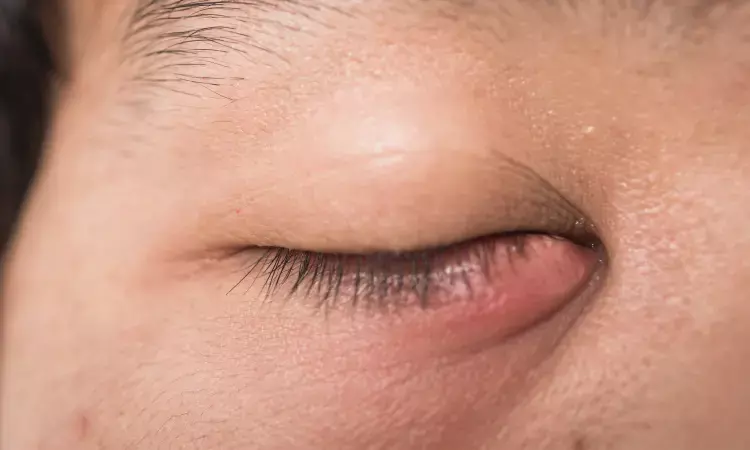- Home
- Medical news & Guidelines
- Anesthesiology
- Cardiology and CTVS
- Critical Care
- Dentistry
- Dermatology
- Diabetes and Endocrinology
- ENT
- Gastroenterology
- Medicine
- Nephrology
- Neurology
- Obstretics-Gynaecology
- Oncology
- Ophthalmology
- Orthopaedics
- Pediatrics-Neonatology
- Psychiatry
- Pulmonology
- Radiology
- Surgery
- Urology
- Laboratory Medicine
- Diet
- Nursing
- Paramedical
- Physiotherapy
- Health news
- Fact Check
- Bone Health Fact Check
- Brain Health Fact Check
- Cancer Related Fact Check
- Child Care Fact Check
- Dental and oral health fact check
- Diabetes and metabolic health fact check
- Diet and Nutrition Fact Check
- Eye and ENT Care Fact Check
- Fitness fact check
- Gut health fact check
- Heart health fact check
- Kidney health fact check
- Medical education fact check
- Men's health fact check
- Respiratory fact check
- Skin and hair care fact check
- Vaccine and Immunization fact check
- Women's health fact check
- AYUSH
- State News
- Andaman and Nicobar Islands
- Andhra Pradesh
- Arunachal Pradesh
- Assam
- Bihar
- Chandigarh
- Chattisgarh
- Dadra and Nagar Haveli
- Daman and Diu
- Delhi
- Goa
- Gujarat
- Haryana
- Himachal Pradesh
- Jammu & Kashmir
- Jharkhand
- Karnataka
- Kerala
- Ladakh
- Lakshadweep
- Madhya Pradesh
- Maharashtra
- Manipur
- Meghalaya
- Mizoram
- Nagaland
- Odisha
- Puducherry
- Punjab
- Rajasthan
- Sikkim
- Tamil Nadu
- Telangana
- Tripura
- Uttar Pradesh
- Uttrakhand
- West Bengal
- Medical Education
- Industry
Meibomian gland dysfunction linked to dyslipidemia screening

United States of America: A study published in Optometry and Vision Science, Journal of the American Academy of Optometry, has concluded an association between dyslipidemia and meibomian gland dysfunction (MGD). The author discussed the association of MGD with hypercholesterolemia, hypertriglyceridemia, and elevated serum low-density lipoprotein levels but not with reduced serum high-density lipoprotein levels.
MGD compromises or reduces the quality and quantity of meibum. Previous research has proposed the association between dyslipidemia and MGD, but the estimation still needs to be more apparent. There needs to be more data in this context.
Researchers from the University of Houston and the University of Alabama at Birmingham have evaluated the odds of dyslipidemia in MGD.
The primary purpose of the meta-analysis was to estimate the association between dyslipidemia and MGD.
Pubmed, Scopus and Google Scholar were the databases used and included studies which assessed the association between dyslipidemia and MGD, their qualities determined by Newcastle-Ottawa Scale.
The study results could be summarised as follows:
- There were three case-control and two cohort studies.
- The odds of hypercholesterolemia and hypertriglyceridemia in MGD were 5.45 and 3.28, respectively.
- The odds of elevated serum low-density lipoprotein and reduced high-density lipoprotein were 2.72 and 1.15, respectively.
The study results indicate that MGD patients should be screened for dyslipidemia.
The non-assessment for effects of gender, age, and MGD severity were some of the study's limitations.
Further reading:
Akowuah, Prince K. OD; Owusu, Ebenezer OD; Senanu, Esther Nutifafa OD; Adjei-Anang, Joseph OD, MSc. Association between Dyslipidemia and Meibomian Gland Dysfunction: A Systematic Review and Meta-Analysis. Optometry and Vision Science ():10.1097/OPX.0000000000001994, February 1, 2023. | DOI: 10.1097/OPX.0000000000001994
BDS, MDS in Periodontics and Implantology
Dr. Aditi Yadav is a BDS, MDS in Periodontics and Implantology. She has a clinical experience of 5 years as a laser dental surgeon. She also has a Diploma in clinical research and pharmacovigilance and is a Certified data scientist. She is currently working as a content developer in e-health services. Dr. Yadav has a keen interest in Medical Journalism and is actively involved in Medical Research writing.
Dr Kamal Kant Kohli-MBBS, DTCD- a chest specialist with more than 30 years of practice and a flair for writing clinical articles, Dr Kamal Kant Kohli joined Medical Dialogues as a Chief Editor of Medical News. Besides writing articles, as an editor, he proofreads and verifies all the medical content published on Medical Dialogues including those coming from journals, studies,medical conferences,guidelines etc. Email: drkohli@medicaldialogues.in. Contact no. 011-43720751


